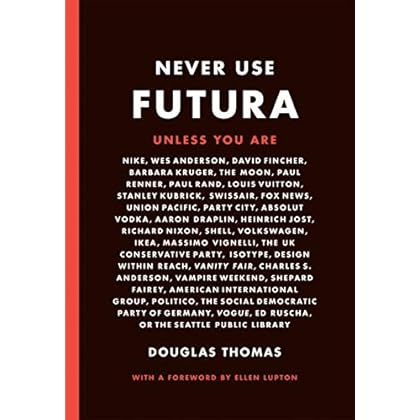Never Use Futura (The history of a typeface)
Category: Books,Arts & Photography,Graphic Design
Never Use Futura (The history of a typeface) Details
Review "Never Use Futura tells a smart, incisive story about the way one typeface became woven into our cultural sentiments and movements. New designers will start to notice Futura everywhere. Seasoned designers will see layers of meaning in Futura (and its look-alikes) everywhere. In either case, Never Use Futura may change the way you see our world." - Maya Lim, Design Observer "Thomas's wonderful book charts [Futura's] history in an inviting, digestible way." - Metropolis "The result is a contemporary lens upon the face, showing its application in film titles and interior motifs for Wes Andersen, campaign buttons for Richard Nixon and artwork by Barbara Kruger. Must read." - Steven Heller, Print"Helvetica, much as I adore it, has had more than its fair share of attention. That's why I'm so happy to see this new book by designer, writer, and historian Douglas Thomas all about the typeface Futura which, it's worth noting, predated Helvetica by three full decades--and it looks as beautiful and timely as ever." - Khoi Vihn, Subtraction.com Read more About the Author Douglas Thomas is a graphic designer, writer, and historian. He holds an MA in history from the University of Chicago and an MFA in graphic design from the Maryland Institute College of Art, where he also taught. He currently teaches at Brigham Young University. His design work has been featured in Communication Arts, Print magazine, and Graphis. Read more

Reviews
This books is well organized and well written. In general, it is fascinating. Comments about not understanding why Futura can make a good typeface to use are unfounded. Complaints about the number of footnotes are also unjustified. The book is well documented--not just unfounded generalities, but specificities that give it credibility.However, can we please get away from gratuitous political commentary? I'm so tired of experts who feel like they must comment on Donald Trump and virtue signal, instead of providing objective observations about subject matter. By the way, I would make the same complaint if the gratuitous commentary was about Hillary Clinton. It's just not needed.In many cases, the illustrations (and captions) in the book are screened (?) so that they are extremely hard to read. I'm not sure why this occurred, but this was a big disappointment.


